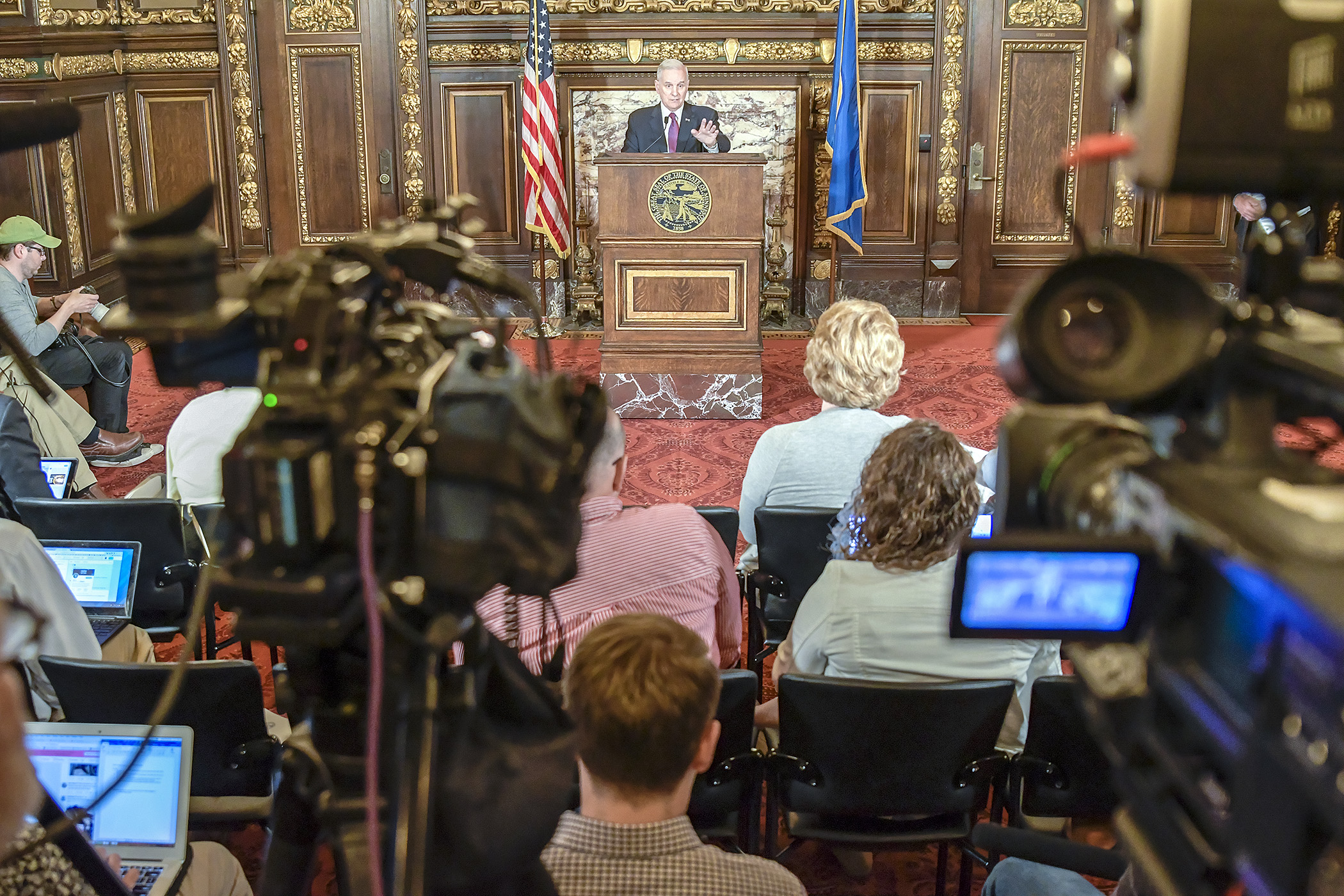Dayton — reluctantly — signs bonding bill into law

Not thrilled by the bonding package put on his desk, Gov. Mark Dayton has nonetheless put his signature on a nearly $1.46 billion capital investment law.
Sponsored by Rep. Tim Miller (R-Prinsburg) and Sen. Rich Draheim (R-Madison Lake), the infrastructure-heavy HF4425 contains $825 million of general obligation bonding. It also includes more than $417 million in trunk highway bonds, $62 million in user-financing in conjunction with state dollars and $50 million for affordable housing.
MORE See the spreadsheet
“It is good to see the governor made it official by putting his signature on a very good package which features geographic balance, sticks to the priorities and focuses on infrastructure – all while respecting the taxpayers,” Rep. Dean Urdahl (R-Grove City) said in a statement. He chairs the House Capital Investment Committee. “It’s been a long process and, through it all, we operated under the notion that Minnesotans expect us to maintain public infrastructure [and] that we should take care of the property we own.
“School safety is another top priority and I am pleased we are providing $25 million to make safety improvements at our schools. It is satisfying to reach the finish line and I am proud of the work we did on this bill.”
Traditionally, the second year of a biennium is focused on capital investment; however, a nearly billion-dollar general obligation package was enacted last session. No bill was passed in 2016.
After receiving $3.3 billion in requests, Gov. Mark Dayton put forth his own $1.5 billion plan in January.
“I am signing this bill, despite my objections, because areas throughout Minnesota need the projects and the jobs, which it will provide,” Dayton said in a statement. “However, the GOP majorities set an arbitrary, ill-founded, and woefully inadequate limit to the total size of the bill. It underfunds critical investments in higher education, state parks, and water infrastructure, and assures that those needs will become more urgent and more expensive in the future.”
Spending in the bill (from all funds) includes:
- $544 million for transportation;
- $208 million for higher education asset preservation and other construction;
- $133 million for water quality;
- $32 million for veterans homes in Preston, Bemidji and Montevideo;
- $28 million for mental health crisis centers; and
- $25 million from state budget reserves for school safety grants.
In addition to the law’s “ignorant and irresponsible” zero funding for public transit, the governor also believes an “unfortunate precedent” is being set by subverting the Legislative-Citizen Commission on Minnesota Resources process. Dayton said projects that have not undergone LCCMR review have been added while draining $98 million from the trust fund to underwrite other projects.
Dayton did line-item veto $1 million in the 2020-21 biennium, which he says would “add an unnecessary new layer of bureaucracy to review the scientific work of the MPCA for water quality standards and permits. This appropriation complicates the rulemaking process instead of making it more efficient. Water quality needs expedited action, not additional bureaucracy.”
Republican leadership reacts
Statement from House Speaker Kurt Daudt (R-Crown): “Our Republican-led legislature delivered a strong package focused on roads and bridges, veteran’s homes, school safety, and clean water infrastructure to Governor Dayton’s desk.”
Statement from Senate Majority Leader Paul Gazelka (R-Nisswa): “Governor Dayton is making the right choice to sign the legislature’s infrastructure bill. It’s a perfect combination of investments to rebuild safer roads, maintain statewide infrastructure, care for our veterans, and address mental health emergencies. It’s big enough to make a significant difference in Minnesotans’ lives, but not so big to put future budgets at risk.”
Related Articles
Search Session Daily
Advanced Search OptionsPriority Dailies
Ways and Means Committee OKs proposed $512 million supplemental budget on party-line vote
By Mike Cook Meeting more needs or fiscal irresponsibility is one way to sum up the differences among the two parties on a supplemental spending package a year after a $72 billion state budg...
Meeting more needs or fiscal irresponsibility is one way to sum up the differences among the two parties on a supplemental spending package a year after a $72 billion state budg...
Minnesota’s projected budget surplus balloons to $3.7 billion, but fiscal pressure still looms
By Rob Hubbard Just as Minnesota has experienced a warmer winter than usual, so has the state’s budget outlook warmed over the past few months.
On Thursday, Minnesota Management and Budget...
Just as Minnesota has experienced a warmer winter than usual, so has the state’s budget outlook warmed over the past few months.
On Thursday, Minnesota Management and Budget...